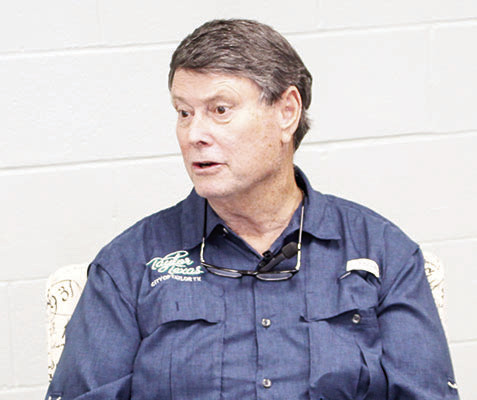
“We are wide open with things going on right now,” Gray said.
Gray’s department is responsible for the overall direction and administration of the various functions including street and parks maintenance, solid waste collection, parking and storm water drainage. In addition to these general fund activities, public works is responsible for administration of the wastewater utilities, airport and cemetery.
“The city has done a very good job getting grant projects in our drainage and working on some for additional sidewalks,” Gray said.
Gray discussed how the incoming Samsung Austin Semiconductor plant will affect water in the city, which some residents have expressed concern about.
According to Gray, residents were worried the semiconductor would use all the city’s water.
However, Gray said that the semiconductor will primarily be using their own water that will be provided by a private company. He said they are bringing in their own water to be used for industrial purposes.
Gray said the semiconductor will pay for city water for what he refers to as “domestic water.”
“We’re going to do anywhere from threequarters of a million gallons a day to a million gallons a day, which isn’t a huge impact to us,” Gray said. “We’ll supply them and they’ll pay us for that water. They’re going to bring in a line that will use more water than we will use in Taylor.”
Gray also talked about his department’s methods of repairing streets during his appearance on the show. Something he described was the city’s levelup program, where a thin coat of asphalt is added to the street to help smooth the surface.
He said leveling up a street is just a temporary fix and does not help it structurally. Structural improvements involve other street maintenance methods, which are patching and complete replacement of the road.
Since leveling up every street in a tight timeframe is not necessarily feasible, Gray described the city’s process in prioritizing which streets received attention.
“The (City Council) paid, in 2019, to do a study of every street in the city,” Gray said. “Every street, and even segments of streets, were given a numerical value. We call it the Pavement Condition Index, so it has a PCI score. We started at zero, which was failed and the worst that it was, and it goes all the way to good.”
Gray said 60% of Taylor’s streets are considered as failing. He also said the city is set to complete another PCI study this year.
The full episode can be found on the Taylor Press Facebook page.



